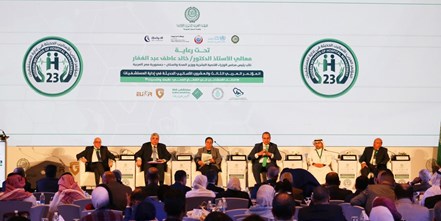



Under the patronage of the Deputy Prime Minister and Minister of Health and Population,
The Chairman of Egypt Healthcare Authority participates in the 23rd Arab Conference on Modern Methods in Hospital Management, held under the theme: "Artificial Intelligence in the Healthcare Sector," organized by the Arab Administrative Development Organization.
Chairman of Egypt Healthcare Authority delivers a keynote speech on the significance of artificial intelligence in advancing medical systems, keeping pace with modern developments, and enhancing the future of healthcare in the Arab world.
Chairman of Egypt Healthcare Authority: The modern Egyptian healthcare system is built on technology across all stages, and the Universal Health Insurance Project could not have been launched without technology to achieve comprehensive healthcare for a nation with over 120 million residents or guests, while overcoming diverse geographical challenges.
Chairman of Egypt Healthcare Authority: We adopt the concept of e-health, including artificial intelligence, virtual services, and remote medical monitoring devices, emphasizing the importance of enacting a unified law to regulate and govern artificial intelligence usage, while ensuring precise and effective data utilization.
Chairman of Egypt Healthcare Authority: Implementing e-health in the second phase of the Universal Health Insurance System reduces hospital occupancy rates by 30-40%, accelerates diagnoses, improves their accuracy, and expands service access to remote areas at lower investment costs.
Chairman of Egypt Healthcare Authority: We proudly present an integrated electronic system for delivering healthcare services, encompassing the registration of over 6 million citizens with unified health records, fully digitalized management systems for primary care facilities (100%) and 80% of medical complexes and hospitals. We are committed to building on these achievements.
Chairman of Egypt Healthcare Authority: Artificial intelligence is now a cornerstone for achieving universal health coverage, health security, preparedness for future pandemics, and sustainability. Investing in AI algorithms in the Arab world is essential for shaping the future of healthcare globally.
Chairman of Egypt Healthcare Authority: Strengthening Arab collaboration is crucial to achieving universal health coverage and ensuring high-quality healthcare. The Arab Conference serves as a golden platform for exchanging expertise and advancing the Sustainable Development Goals 2030.
Dr. Ahmed El-Sobky, Chairman of Egypt Healthcare Authority and General Supervisor of the Universal Health Insurance Project, participated in the 23rd Arab Conference titled "Modern Methods in Hospital Management," held on December 10–11 in Cairo. The conference, organized by the Arab Administrative Development Organization under the League of Arab States, focused on "Artificial Intelligence in the Healthcare Sector: Dimensions and Challenges."
The conference was held under the patronage of H.E. Prof. Dr. Khaled Abdel Ghaffar, Deputy Prime Minister for Human Development and Minister of Health and Population, alongside Prof. Dr. Mohamed Awad Tag El-Din, Presidential Advisor for Health and Prevention; Dr. Hanan Balkhy, Regional Director of the World Health Organization for the Eastern Mediterranean Region; Prof. Dr. Maha El-Rabat, Public Health Professor and Former Minister of Health; Dr. Nasser Al-Qahtani, Director General of the Arab Administrative Development Organization; and other distinguished figures.
During his keynote address, Dr. El-Sobky expressed his pleasure in participating in the conference, highlighting this year’s theme on artificial intelligence and its transformative role in healthcare.
Dr. El-Sobky emphasized that the modern Egyptian healthcare system relies heavily on technology across all stages. He noted that the Universal Health Insurance Project, designed to provide comprehensive healthcare for over 120 million residents and visitors, would not have been possible without technology to overcome the country’s diverse geographical challenges.
He outlined the Authority's commitment to e-health, integrating artificial intelligence, virtual healthcare, and remote monitoring devices. He also stressed the necessity of drafting a unified law to regulate and govern artificial intelligence applications and maximize data utility effectively.
Dr. El-Sobky highlighted the impact of e-health on the second phase of the Universal Health Insurance System, reducing hospital occupancy rates by 30-40%, accelerating diagnosis times, and enhancing accuracy. Additionally, e-health expands service delivery to remote areas at reduced investment costs.
He further showcased the Authority's achievements in establishing an integrated digital healthcare system, including the registration of over 6 million citizens with unified health records and the full digitalization of 100% of primary care facilities and 80% of medical complexes and hospitals. He reaffirmed the Authority’s commitment to building on these milestones.
Dr. El-Sobky concluded by emphasizing the essential role of artificial intelligence in achieving universal health coverage, health security, and preparedness for future pandemics, advocating for investments in AI algorithms across the Arab region to shape the global future of healthcare.
He called for strengthened Arab cooperation to advance universal health coverage and ensure equitable access to high-quality healthcare, describing the Arab Conference as a golden opportunity for sharing experiences and best practices to achieve the Sustainable Development Goals 2030.
The main conference session featured esteemed participants, including Dr. Aws Bin Ibrahim Al-Shamsan, Secretary-General of the Saudi Commission for Health Specialties; Dr. Sameh Al-Saharty, Senior Health Policy Advisor at the World Bank; and Prof. Dr. Ahmed El-Gohary, Advisor to the Minister of Health and Population for Technical Health Education. The session was moderated by Prof. Dr. Mohamed Awad Tag El-Din and Prof. Dr. Maha El-Rabat, with virtual contributions from Dr. Awad Mataria, WHO’s Regional Director for Universal Health Coverage and Health Systems in the Eastern Mediterranean Region.
The conference, attended by health leaders, executives, and experts from several Arab countries, also featured awards and multiple panel discussions addressing artificial intelligence's role in healthcare systems, the opportunities and challenges in its applications, human-centered approaches in AI, innovations in AI research for healthcare improvement, and successful case studies in implementing AI in healthcare.